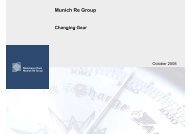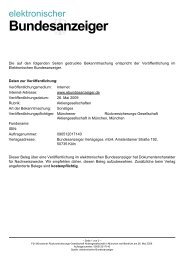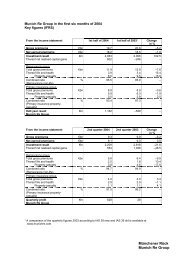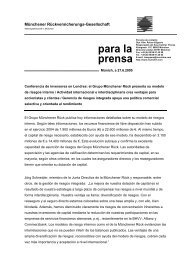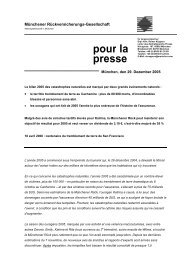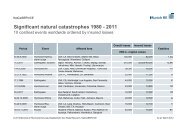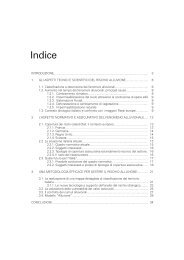Quarterly Report 3/2008 (PDF, 308 KB) - Munich Re
Quarterly Report 3/2008 (PDF, 308 KB) - Munich Re
Quarterly Report 3/2008 (PDF, 308 KB) - Munich Re
Create successful ePaper yourself
Turn your PDF publications into a flip-book with our unique Google optimized e-Paper software.
Interim management report Business experience<br />
Changes in the value of share portfolios categorised as “available for sale” are<br />
always recognised in equity with no effect on profit or loss. Only when they<br />
are sold are the amounts of such holdings recorded in the income statement.<br />
An exception to this rule exists in the event of a sustained impairment. We<br />
consider an impairment to be “sustained” if an equity’s stock market price<br />
falls below the average historical acquisition cost either for a sustained<br />
period, i.e. at least six months, or significantly, i.e. by at least 20%. If an<br />
impairment occurs, the accumulated loss previously recognised in equity is<br />
eliminated and recognised in the income statement as an expense. Further<br />
declines in the prices of equities that have already been written down once are<br />
recognised immediately in the income statement. This was relevant to approximately<br />
two-thirds of the impairments booked.<br />
Another special feature applies to changes in the market value of individual<br />
equity portfolios for which hedge accounting using derivatives is employed.<br />
Where this is the case, any change in value must be recognised immediately<br />
in the income statement, i.e. with write-downs for share-price losses and<br />
write-ups for price gains.<br />
Between January and September <strong>2008</strong>, we made total write-downs of €5,274m<br />
(1,564m), of which €4,010m (289m) were on our equity portfolios. Although<br />
prices in the most important indices stabilised at the start of the third quarter,<br />
they dropped significantly again from mid-September onwards, necessitating<br />
€1,789m (224m) in write-downs on our equity portfolio between July and<br />
September <strong>2008</strong>.<br />
In total, however, approximately one-third of the write-downs we made in the<br />
period under consideration involved equity portfolios for which the value fluctuations<br />
were more or less offset by price gains on hedging derivatives. Some<br />
of the other impairments on our equity portfolios were compensated for by<br />
yields from the countervailing performance of economic hedging transactions,<br />
without a direct hedging relationship. This led to significant increases<br />
in the value of hedging instruments in the period from January to September.<br />
Of our write-ups of €2,958 (798m), derivatives accounted for virtually the<br />
whole amount, with €2,901m (609m) in the period under review, €1,199m<br />
(307m) of which was in the third quarter.<br />
Our portfolio of fixed-interest securities in the “available for sale” category is<br />
accounted for at fair value and takes into consideration the development of<br />
risk spreads as well as current interest-rate changes. Any resulting changes<br />
in value are recognised in equity with no effect on profit or loss. Nevertheless,<br />
as with equity instruments, these fixed-interest securities are subjected to an<br />
impairment test at every (quarterly) balance sheet date. If there is objective<br />
evidence for an impairment, e.g. substantial financial risks relating to the<br />
issuer, this must be recognised as an expense in the income statement. The<br />
downgrading of an issuer’s credit rating and an interest-rate-induced decline<br />
in market value are not in themselves sufficient grounds for an impairment<br />
but, depending on the intensity, may be cause for closer scrutiny of whether<br />
the critiera for an impairment are met.<br />
Overall, however, the revaluation of the <strong>Munich</strong> <strong>Re</strong> Group’s entire portfolio of<br />
fixed-interest securities categorised as “available for sale” in the period under<br />
review only resulted in write-downs totalling approximately €101m, of which<br />
approximately €60m is apportionable to fixed-interest securities issued by<br />
Lehman Brothers. Altogether our business relations with Lehman Brothers,<br />
which involve various capital market transactions, have led to impairments<br />
totalling around €115m net following the company’s application for creditor<br />
protection.<br />
<strong>Munich</strong> <strong>Re</strong> Group <strong>Quarterly</strong> <strong><strong>Re</strong>port</strong> 3/<strong>2008</strong><br />
13





